Occupational therapy is an important part of the healing process for people with various physical, mental, and emotional health conditions.
Group activities are a great way to help patients improve their physical and mental health, increase their self-esteem, and promote social interaction and support.
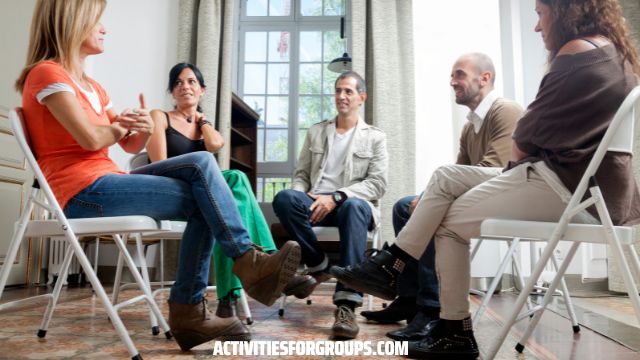
Whether you’re looking for fun occupational therapy activities for the elderly, stroke patients, dementia patients, schizophrenia patients, or anyone else, this article has got you covered.
20 Occupational Therapy Group Activities Ideas For Mental and Physical Health
| Activity | Explanation |
|---|---|
| 1. Yoga | Yoga promotes relaxation, improves flexibility, and enhances body awareness and mindfulness. |
| 2. Art Therapy | Engaging in art activities helps reduce stress, express emotions, and enhance creativity and self-esteem. |
| 3. Group Games | Playing games such as charades or Pictionary fosters social interaction, cognitive skills, and teamwork. |
| 4. Dance Therapy | Dancing improves coordination, balance, and body awareness while providing a creative outlet for self-expression. |
| 5. Outdoor Adventures | Outdoor activities like hiking or nature walks improve physical fitness, sensory stimulation, and mental well-being. |
| 6. Music Therapy | Engaging in music activities enhances mood, stimulates cognitive function, and promotes social interaction. |
| 7. Mindfulness Meditation | Mindfulness meditation helps reduce anxiety, improve focus, and develop self-awareness and emotional regulation skills. |
| 8. Cooking Classes | Cooking activities promote fine motor skills, cognitive abilities, and social interaction while learning new recipes. |
| 9. Gardening | Gardening enhances fine motor skills, sensory stimulation, and provides a sense of accomplishment and connection with nature. |
| 10. Therapeutic Crafts | Engaging in crafts like knitting or pottery improves dexterity, cognitive skills, and provides a calming and creative outlet. |
| 11. Group Exercise Classes | Participating in group exercise classes like aerobics or Zumba improves physical fitness, coordination, and socialization. |
| 12. Puzzle Challenges | Solving puzzles boosts cognitive skills, problem-solving abilities, and promotes cooperation and teamwork. |
| 13. Sensory Play | Sensory activities like playing with sand or water stimulate the senses, improve focus, and provide relaxation. |
| 14. Drama Therapy | Engaging in drama activities enhances self-expression, emotional regulation, and social skills through role-playing and improvisation. |
| 15. Journaling | Writing in a journal encourages self-reflection, emotional expression, and improves written communication skills. |
| 16. Pet Therapy | Interacting with therapy animals improves mood, reduces anxiety, and provides a sense of comfort and companionship. |
| 17. Tai Chi | Tai Chi promotes relaxation, improves balance, and enhances body awareness and mindfulness through slow and controlled movements. |
| 18. Group Discussions | Engaging in group discussions promotes communication skills, social interaction, and enhances cognitive abilities. |
| 19. Sensory Walks | Going on sensory walks with different textures, smells, and sounds provides sensory stimulation and promotes mindfulness. |
| 20. Relaxation Techniques | Learning and practicing relaxation techniques such as deep breathing or progressive muscle relaxation helps reduce stress and promote relaxation. |
These activities can be tailored to the specific needs and abilities of the group participants and can be highly beneficial for their mental and physical well-being.
Recommended Products for Occupational Therapy Activities
Each product has been selected to support specific therapeutic goals while being durable enough for group use. All items are available on Amazon and can be easily integrated into the activities described in the article.
Art Therapy Supplies
- Royal & Langnickel All Media Easel Artist Set – Complete 104-piece art set with carrying case, perfect for group art therapy sessions
- Crayola Adult Coloring Set – Includes colored pencils, fine line markers, and adult coloring books for stress relief
- Creativity Street Clay Activity Set – Non-toxic modeling clay set with tools for sensory and fine motor activities
Exercise & Movement
- Theraband Resistance Band Set – Professional latex bands in varying resistances for rehabilitation exercises
- URBNFit Balance Disc – Inflatable wobble cushion for balance training and core strengthening
- YogaAccessories Non-Slip Exercise Mat – Extra thick mat with carrying strap for floor exercises and yoga
Cognitive & Memory Games
- Hasbro Gaming Simon Classic – Electronic memory game for cognitive stimulation
- Melissa & Doug Pattern Blocks – Wooden shape puzzle set for spatial reasoning
- AQUARIUS Memory Master Game – Card-based memory enhancement game suitable for groups
Sensory Tools
- Sensory Fidget Toy Set – 20-piece varied texture fidget set for anxiety relief
- Kinetic Sand Sensory Box – Natural sand compound for tactile stimulation
- Miracle-Gro Indoor Plant Kit – Complete gardening set for horticultural therapy activities
Fine Motor Skills
- Learning Resources Fine Motor Tool Set – Includes tweezers, droppers, and scissors for hand strength
- Wooden Threading Beads Set – Large wooden beads and laces for dexterity training
- OXO Good Grips Kitchen Tool Set – Adaptive cooking utensils with large grips
Music Therapy
- Remo Sound Shape Pack – Set of hand drums and percussion instruments
- Musician’s Gear Bell Set – 8-note hand bell set for group activities
- West Music Rhythm Band Set – 15-piece percussion set for group music therapy
Relaxation & Mindfulness
- Buddha Board Original – Water painting board for mindful art practice
- Mindfulness Cards – 50 prompts for guided meditation and breathing exercises
- Weighted Heating Pad – Microwaveable aromatherapy neck wrap for relaxation
Writing & Communication
- Large Print Word Search – Visual and cognitive exercise book
- AmazonBasics Ruled Journal Set – Set of 4 journals for therapeutic writing
- EXPO Low-Odor Dry Erase Set – Whiteboard markers and board for group activities
When Is Group Therapy For Occupational Therapy Appropriate?
Group therapy for occupational therapy is appropriate when individuals can benefit from the support and encouragement of others who are facing similar challenges.
Group therapy can be particularly beneficial for individuals who may feel isolated or discouraged in their recovery journey, as well as for those who benefit from the motivation of working towards common goals with others.
Group therapy for occupational therapy is typically appropriate for individuals with a range of physical, mental, or cognitive conditions, including but not limited to:
- Stroke patients
- Dementia patients
- Patients with schizophrenia
- Individuals with mental health conditions, such as depression or anxiety
- Elderly individuals with physical or cognitive limitations
- Orthopaedic patients
It is important to note that group therapy should always be done under the guidance of a licensed occupational therapist, who can assess the individual’s needs and determine if group therapy is appropriate.
In some cases, group therapy may not be appropriate for individuals with certain medical conditions or cognitive abilities, so it is important to work closely with a healthcare professional to ensure that group therapy is safe and effective.
Occupational Therapy Group Activities For Mental Health

- Art Therapy: Art therapy is a great way to explore emotions and feelings, improve communication skills, and reduce stress. Encourage patients to create paintings, drawings, or other forms of art to help them express themselves.
- Music Therapy: Music has a powerful impact on the mind and body. Encourage patients to join a choir, play musical instruments, or simply listen to music together.
- Movement Therapy: Movement therapy is a fun way to improve physical and mental health. Encourage patients to participate in group dances, yoga, tai chi, or other forms of movement therapy.
Occupational Therapy Group Activities For The Elderly

- Gardening: Gardening is a great way to improve physical health and reduce stress. Encourage patients to work together to plant and care for a garden.
- Cooking: Cooking is a fun way to improve hand-eye coordination and increase social interaction. Encourage patients to prepare meals together and enjoy the food they’ve made.
- Reading Group: Encourage patients to join a reading group to improve cognitive function, increase social interaction, and reduce stress.
Occupational Therapy Group Activities For Dementia Patients
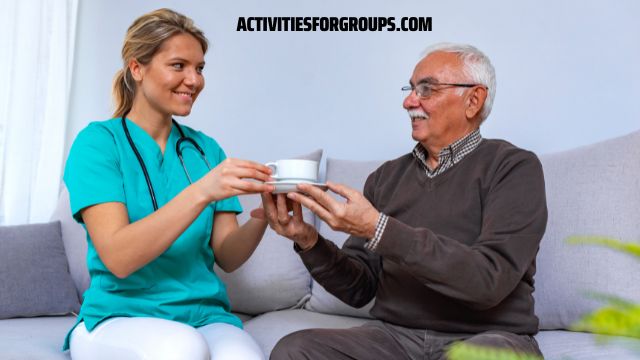
- Memory Games: Memory games are a great way to improve cognitive function and increase social interaction. Encourage patients to play games like Bingo, matching games, or crossword puzzles together.
- Sensory Stimulation: Sensory stimulation is a great way to engage patients with dementia and improve their quality of life. Encourage patients to participate in activities that stimulate their sense of smell, touch, taste, sound, and sight.
- Reminiscence Therapy: Reminiscence therapy is a fun way to help patients with dementia recall past experiences and improve their quality of life. Encourage patients to share stories, look at old photos, or listen to music from their past.
Occupational Therapy Group Activities For Stroke Patients
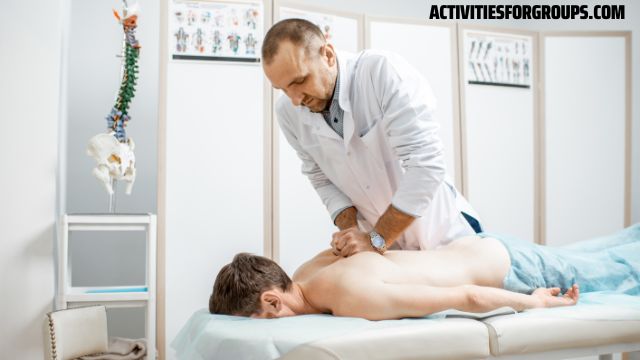
- Exercise Group: Exercise is a great way to improve physical and mental health for stroke patients. Encourage patients to participate in group exercise classes, such as yoga, tai chi, or stretching.
- Cooking Class: Cooking is a fun way to improve hand-eye coordination and increase social interaction for stroke patients. Encourage patients to prepare meals together and enjoy the food they’ve made.
- Creative Writing: Encourage stroke patients to join a creative writing group to improve their cognitive function, increase social interaction, and reduce stress.
Occupational Therapy Group Activities For Patients With Schizophrenia
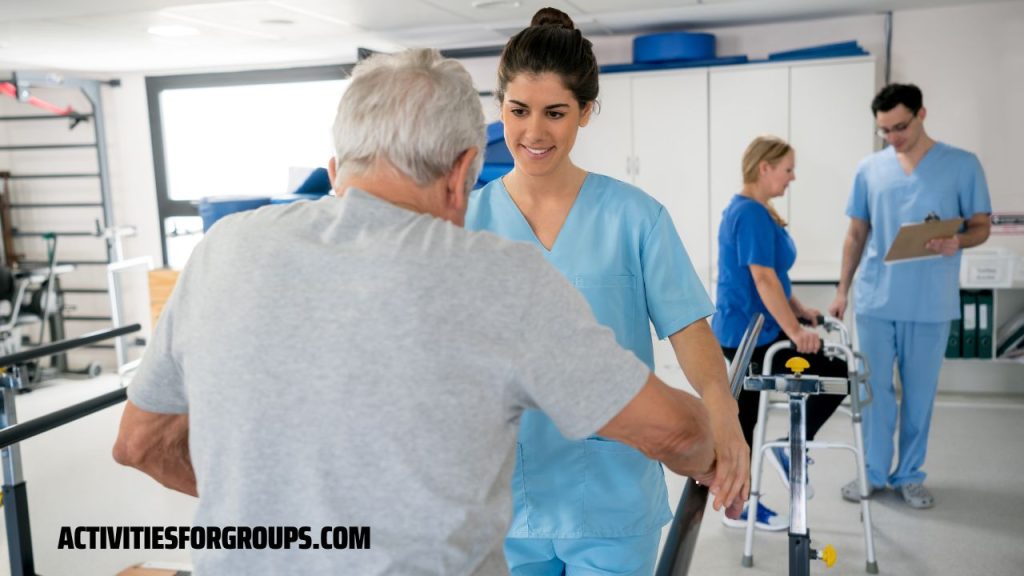
- Art Therapy: Art therapy is a great way to explore emotions and feelings, improve communication skills, and reduce stress in patients with schizophrenia. Encourage patients to create paintings, drawings, or other forms of art to help them express themselves.
- Music Therapy: Music has a powerful impact on the mind and bodies of patients with schizophrenia. Encourage patients to join a choir, play musical instruments, or simply listen to music together.
- Movement Therapy: Movement therapy is a fun way to improve physical and mental health for patients with schizophrenia. Encourage patients to participate in group dances, yoga, tai chi, or other forms of movement therapy.
Occupational Therapy Group Activities For Orthopedic Patients
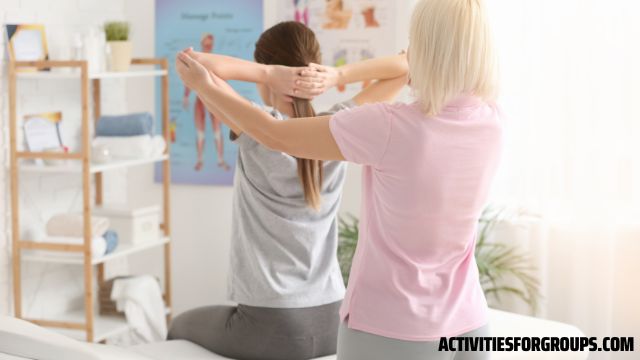
- Woodworking: Woodworking is a fun and engaging way to improve hand strength and dexterity for orthopedic patients. Encourage patients to join a woodworking club or participate in group woodworking projects, such as building birdhouses or creating wooden crafts.
- Exercise Classes: Exercise classes, such as yoga, tai chi, or strength training, can help improve physical function and mobility for orthopedic patients. Encourage patients to participate in group exercise classes for a fun and supportive workout experience.
- Cooking Classes: Cooking classes can help improve hand dexterity, fine motor skills, and hand-eye coordination for orthopedic patients. Encourage patients to participate in group cooking classes to learn new recipes and techniques while improving their physical abilities.
- Art Therapy: Art therapy is a fun and engaging way to improve hand dexterity and fine motor skills for orthopedic patients. Encourage patients to participate in group art therapy sessions, such as painting, drawing, or sculpting.
Frequently Asked Questions [FAQs]
Q: What Are The Benefits Of Occupational Therapy Group Activities?
A: Occupational therapy group activities can help improve physical and mental health, increase self-esteem, and promote social interaction and support. Group activities are also a great way to reduce stress and improve the quality of life for people with various health conditions.
Q: How Can I Find Occupational Therapy Group Activities Near Me?
A: You can find occupational therapy group activities near you by searching online, talking to your doctor or occupational therapist, or contacting local community organizations.
Q: Are Occupational Therapy Group Activities Suitable For Everyone?
A: Occupational therapy group activities can be suitable for people of all ages and abilities, but it is best to consult with a healthcare professional or occupational therapist to determine what activities would be best for you or your loved one.
Q: Is It Necessary To Attend Occupational Therapy Group Activities Regularly?
A: Regular attendance can help maximize the benefits of occupational therapy group activities, but it ultimately depends on the individual’s needs and circumstances. Your occupational therapist can help you determine the best schedule for you.
Q: Can Occupational Therapy Group Activities Be Done At Home?
A: Yes, many occupational therapy group activities can be done at home with the help of an occupational therapist or a caregiver. Some activities may require special equipment or supplies, but your occupational therapist can provide recommendations and resources.
Q: How Can I Join An Occupational Therapy Group Activity?
A: You can join an occupational therapy group activity by contacting a healthcare professional or occupational therapist for a referral, or by searching for available group activities in your local community.
Q: What Are The Costs Associated With Occupational Therapy Group Activities?
A: The cost of occupational therapy group activities can vary depending on the type of activity and the location. Some group activities may be covered by insurance, while others may require a fee. Your healthcare professional or occupational therapist can provide more information on the costs associated with specific group activities.
Conclusion:
Occupational therapy group activities are a fun and engaging way to improve the physical and mental health of people with various health conditions. From art therapy to cooking classes, there are many creative and engaging activities to choose from.
By participating in group activities, patients can increase their self-esteem, reduce stress, and improve their quality of life. If you or a loved one is in need of occupational therapy, consider trying one of the many group activities available today.




Leave a Reply